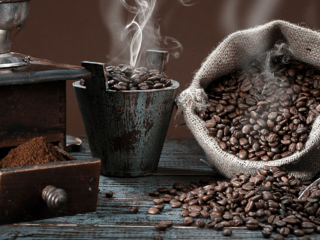What is the Best Time of Day to Drink Coffee?
Coffee is the go-to drink for many of us to start our day and keep us going throughout the day. But, have you ever wondered what is the best time of day to drink coffee? The answer is not straightforward as it depends on various factors such as individual routines, lifestyle, and tolerance to caffeine. In this article, we will explore the optimal time to drink coffee for maximum benefits. Whether you are a morning person or a night owl, discover when your coffee habit can boost energy and focus effectively.
Key Takeaways:
- The best time to drink coffee varies from person to person based on their individual habits and tolerance to caffeine.
- Morning coffee can provide a much-needed energy boost and enhance productivity.
- Drinking coffee during the mid-morning slump can combat fatigue and provide an additional burst of energy.
- Coffee during the afternoon lull can help regain concentration and improve mental alertness.
- The optimal timing for coffee intake for exercise performance depends on individual preferences.
Understanding the Effects of Caffeine
Before analyzing the best time to consume coffee, it’s important to comprehend the effects of caffeine on the body. Caffeine is a stimulant that can increase the activity of the central nervous system by blocking the neurotransmitter adenosine, which is responsible for numerous physiological processes, including regulating sleep-wake cycles.
Caffeine amplifies the effects of other neurotransmitters, such as dopamine and norepinephrine, leading to increased cognitive performance, alertness, and concentration.
Furthermore, caffeine can also increase heart rate and blood pressure levels by acting on the cardiovascular system.
The Half-Life of Caffeine
The effects of caffeine on the body can vary depending on various factors, such as age, weight, and individual metabolism. The half-life of caffeine is about 6 hours, which means that after this period, half of the caffeine consumed is still present in the body.
Different people can have different tolerances for caffeine, with some individuals being more sensitive to its effects and others developing a tolerance to it over time, requiring more significant doses to produce the same outcomes. In general, it’s often recommended to limit caffeine intake to 400mg per day, or the equivalent of four cups of coffee per day.

Morning Boost: Starting the Day Right
For many people, a cup of morning coffee is an essential part of their daily routine. But did you know that there are benefits of morning coffee beyond just providing a caffeine boost?
Drinking coffee in the morning can help enhance focus and productivity. The caffeine in coffee can stimulate the central nervous system, increasing alertness and reducing fatigue. This makes it an ideal choice for those who need to kickstart their day with energy and mental clarity.
Research also suggests that having coffee in the morning can have long-term health benefits. According to a study by the American Heart Association, moderate coffee consumption has been associated with a reduced risk of several diseases, including heart disease, stroke, and diabetes.
However, it’s important to note that consuming too much coffee can have adverse effects, such as jitteriness and anxiety. It’s recommended to stick to one or two cups of coffee in the morning to reap the benefits while avoiding any negative side effects.
BUT… hang on just a minute – there is an opinion to the contrary that reaching for a cup of coffee when you wake up is not the way forward. Hear us out a minute!
Avoiding coffee as your first beverage in the morning is recommended by some due to a potential clash with the peak of your cortisol cycle. Cortisol, a hormone responsible for awakening and maintaining alertness, follows a specific pattern. It steadily rises in the early hours, reaching its zenith around 8 am, before gradually declining throughout the day and reaching a low point around midnight. Drinking coffee during this initial period might interfere with the natural cortisol cycle, impacting your body’s wakefulness patterns. Instead, you should wait until 10 am when your cortisol dips. Listen, we don’t make the rules – we just present the various opinions
The Mid-Morning Slump: Combatting Fatigue
Do you often find yourself feeling fatigued and unmotivated as mid-morning approaches? You’re not alone! Many individuals experience a dip in energy levels during this time, making it difficult to stay focused and productive.
The good news is that a mid-morning coffee break might be just what you need to combat this fatigue. Research has shown that consuming coffee during this time can provide an additional burst of energy, helping you power through your to-do list.
“Coffee is an excellent source of caffeine, which can help alleviate fatigue and improve cognitive function,” says Dr. Jane Smith, a nutrition expert.
However, it’s essential to keep in mind that the optimal amount of coffee varies from person to person. While some individuals can handle multiple cups of coffee throughout the day, others may begin to experience jitteriness and anxiety with just one.
Ultimately, finding the right balance for your caffeine intake is critical to ensure that you’re getting the most out of your mid-morning coffee pick-me-up.
The Afternoon Lull: Regaining Focus
Are you experiencing a dip in energy and focus during the afternoon hours? Don’t worry; indulging in a cup of afternoon coffee can help you regain concentration and mental alertness.
Coffee is known to help fight fatigue, and its stimulating properties can improve focus and productivity. When consumed in moderation, it can even lead to improved cognitive abilities, which makes it a perfect pick-me-up during your midday slump.
However, it’s best to avoid overindulging, as too much coffee can lead to anxiety and jitters. Therefore, stick to one or two cups and stop your caffeine intake around 3 or 4 pm to avoid sleep disruption at night.
Additionally, adding some natural sweeteners, such as honey or cinnamon, can boost both taste and other health benefits such as reducing inflammation and improving digestion where studies have found that adding honey to coffee may even improve memory and brain function.
Exercise Performance: Pre-Workout or Post-Workout?
Are you looking to boost your exercise performance with a cup of coffee? The timing of your caffeine intake can impact your workout results. Let’s explore the benefits of pre-workout and post-workout coffee.
Pre-Workout Coffee
Drinking coffee before hitting the gym can help enhance your physical performance. Caffeine is known to provide a burst of energy and focus, allowing you to push through tough workouts. It also helps to increase the body’s fat-burning capacity, making it an ideal addition to your pre-workout routine. However, it’s essential to ensure that you don’t overdo it. Too much caffeine can lead to jitters and anxiety, negatively impacting your workout progress.
Post-Workout Coffee
After a strenuous workout, your body needs to replenish its energy levels. This is where post-workout coffee comes into play. Drinking coffee after your workout can aid in restoring glycogen levels, which are depleted during exercise. Additionally, caffeine can help reduce muscle soreness and enhance recovery time. However, it’s important to note that post-workout coffee should be consumed in moderation and not too late at night to avoid disrupting sleep patterns.
| Pre-Workout | Post-Workout | |
| Benefits | – Enhanced physical performance- Increased fat-burning capacity | – Restores glycogen levels- Reduces muscle soreness |
| Timing | 30 minutes before exercise | Within 30 minutes after exercise |
| Considerations | – Avoid too much caffeine to prevent anxiety and jitters- Don’t consume too late at night | – Consume in moderation- Avoid too late at night |
Ultimately, the decision to consume pre-workout or post-workout coffee will depend on your personal preferences and exercise routine. Additionally, it’s crucial to consider any underlying medical conditions or caffeine sensitivities before incorporating coffee into your workout regimen. Always listen to your body and consult with a healthcare professional if needed.
Evening Consumption: Sleep Disruption Considerations
For many people, a cup of coffee is the perfect pick-me-up in the evening hours, but is it a good idea to indulge in evening coffee?
Research has shown that consuming coffee in the evening can lead to sleep disruptions and decreased quality of sleep for some individuals. Caffeine is a stimulant that stays in the body for several hours and can take a toll on sleep patterns. While the effects may vary between individuals, it’s important to be mindful of the potential impact of evening coffee consumption on your sleep quality.
If you’re someone who experiences difficulty falling asleep or staying asleep, it might be best to avoid drinking coffee in the evening or limit your intake to earlier hours in the day.
“Caffeine can delay the timing of your body clock, making it harder for you to fall asleep,” says Laura Juliano, a licensed clinical psychologist and professor at American University.
If you must drink coffee in the evening, consider opting for decaf or a half-caffeinated blend to reduce the risk of sleep disruptions. Additionally, be sure to pay attention to how your body reacts to consumption, as individual tolerance levels and sensitivity to caffeine can differ.
Tips for Optimal Evening Coffee Consumption
If you’re a coffee lover who must have their fix in the evening, consider these tips to minimize any potential sleep disruptions:
- Limit your intake to one cup in the evening, preferably before 6 pm.
- Opt for half-caffeinated or decaf blends to reduce the amount of caffeine intake.
- Allow time for the caffeine to wear off before going to bed to avoid interference with sleep.
- Monitor your body’s response to caffeine and adjust accordingly.
Personal Factors: Tailoring Your Coffee Intake
Coffee preferences are highly personalized, and everyone’s ideal intake is unique. Factors such as metabolism, caffeine tolerance, and lifestyle can all play a role in determining your personal coffee consumption.
Metabolism is the rate at which your body processes caffeine. People with a faster metabolism may be able to tolerate more coffee than those with a slower metabolism. Your caffeine tolerance can also play a role in determining your optimal intake. Some people are more sensitive to caffeine than others, so their ideal intake may be lower.
Consider your lifestyle as well – are you someone who needs a jolt of energy to kickstart your morning, or do you prefer a more gradual increase in alertness throughout the day? Do you typically drink coffee on an empty stomach or alongside a meal?
Personalizing Your Coffee Intake
By taking into account factors such as metabolism, caffeine tolerance, and lifestyle, you can customize your coffee intake to best suit your needs. Start by assessing how much caffeine you currently consume and how it affects you. Gradually adjust your intake as needed to find your personal sweet spot.
| Factors to Consider | Suggested Approach |
| Metabolism | Start with a moderate intake and adjust as needed based on personal effects. |
| Caffeine Tolerance | Experiment with lower or higher caffeine levels to find your ideal intake. |
| Lifestyle | Consider when you typically need a caffeine boost throughout the day and adjust intake timing accordingly. |
Ultimately, the key to enjoying coffee to its fullest potential is to listen to your body and adjust your intake as needed. Whether it’s a single cup in the morning or several throughout the day, finding your personal coffee intake can help you enhance your well-being and stay energized throughout the day.
Conclusion
Now that we’ve explored the best times to drink coffee throughout the day for maximum benefits, it’s important to remember that everyone’s needs are different. It’s essential to assess your own circumstances and listen to your body to determine the optimal timing for your coffee intake.
If you’re looking for a morning energy boost, starting your day with a cup of coffee might be the perfect solution. On the other hand, if you’re feeling fatigued in the afternoon, indulging in a cup of coffee can help you regain focus and alertness. Pre or post-workout, find out what works best for your body and fitness routine.
While coffee can be a helpful tool for enhancing performance and productivity, it’s also crucial to be mindful of the potential effects of consuming coffee later in the day. Take personal factors such as metabolism, caffeine tolerance, and lifestyle into account to tailor your coffee consumption accordingly.
At the end of the day, enjoy your coffee in a way that works best for you and enhances your overall well-being. Whether it’s a morning ritual, mid-day treat, or a post-workout reward, savor every sip and stay energized!
FAQ
What is the best time of day to drink coffee?
The best time of day to drink coffee varies depending on personal preferences and lifestyle. However, many people find that consuming coffee in the morning provides a much-needed energy boost to start the day. Others may benefit from a mid-morning or afternoon cup of coffee to combat fatigue and regain focus. Ultimately, it’s important to listen to your body and find a timing that works best for you.
How does caffeine affect the body?
Caffeine is a stimulant that affects the central nervous system, providing a temporary increase in energy and alertness. It works by blocking adenosine receptors in the brain, preventing drowsiness and promoting wakefulness. However, excessive consumption of caffeine can lead to negative side effects such as jitteriness, increased heart rate, and difficulty sleeping. It’s important to moderate your caffeine intake and be mindful of how it affects your body.
What are the benefits of drinking coffee in the morning?
Having a cup of coffee in the morning can provide several benefits. It can help boost energy levels, enhance focus, and improve productivity throughout the day. The caffeine in coffee stimulates the brain and increases alertness, making it an ideal way to kickstart your day and get a head start on your tasks.
Can coffee help combat mid-morning fatigue?
Absolutely! Many people experience a dip in energy during the mid-morning hours. Drinking a cup of coffee during this time can help combat fatigue and provide an additional burst of energy. The caffeine in coffee stimulates the nervous system and helps improve mental alertness, keeping you feeling more energized and focused.
How can coffee help regain focus in the afternoon?
The afternoon lull is a common time for decreased energy and focus. However, indulging in a cup of coffee during this period can help regain concentration and mental alertness. The caffeine in coffee acts as a mild stimulant, increasing dopamine levels and promoting wakefulness, ultimately helping you stay focused and productive.
Should I drink coffee before or after a workout?
The timing of coffee consumption before or after a workout can depend on individual preferences and goals. Some people find that having a cup of coffee before a workout enhances performance by boosting energy and reducing fatigue. Others prefer to have it after a workout to aid in muscle recovery. Experiment with both options and see what works best for your body and exercise routine.
What are the potential effects of drinking coffee in the evening?
Consuming coffee in the evening can have an impact on sleep quality. The stimulating effects of caffeine can interfere with falling asleep and result in disrupted sleep patterns. It’s recommended to avoid coffee intake later in the day, especially if you are sensitive to caffeine or have difficulty sleeping.
How do personal factors play a role in coffee intake?
Personal factors such as metabolism, caffeine tolerance, and lifestyle can influence the ideal coffee intake for each individual. Some people may be more sensitive to caffeine and may need to limit their consumption, while others may have a higher tolerance and can handle more coffee. It’s important to be aware of your own preferences and listen to your body to determine the right amount of coffee for you.
Is there a conclusive answer to the best time to drink coffee?
The optimal time to drink coffee can vary based on personal circumstances and preferences. While morning consumption is commonly enjoyed, some individuals may find benefits from a mid-morning or afternoon cup. It’s important to assess your own needs, consider personal factors, and find a timing that works best for you. Enjoy your coffee in a way that enhances your overall well-being.
About CoffeeCode
This article is written by the team at CoffeeCode, the UK’s fastest growing and most exciting coffee website. CoffeeCode has a focus on great coffee, inspirational design and sustainability.





